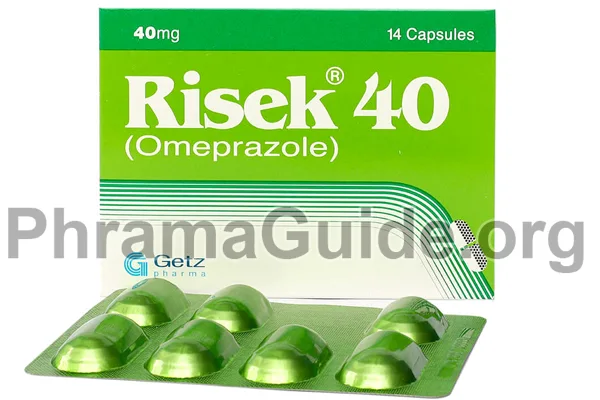Risek is a medication primarily used to treat conditions related to excess stomach acid production. It belongs to a class of drugs known as proton pump inhibitors (PPIs). Following are some common uses of Risek:
- Gastroesophageal Reflux Disease (GERD): Risek is used for the treatment of GERD, a condition in which acid from the stomach flows back into the esophagus, causing heartburn and other symptoms.
- Peptic Ulcer Disease (PUD): Risek is used for the treatment of PUD, a condition in which ulcers develop in the lining of the stomach or small intestine due to excess acid secretion.
- Zollinger-Ellison Syndrome (ZES): Risek is used for the treatment of ZES, a rare condition in which tumors develop in the pancreas or duodenum, causing excess acid secretion.
- Helicobacter Pylori Infection: Risek is used as a part of the treatment for H. pylori infection. H. pylori is a bacterium that can infect the stomach and cause ulcers, gastritis, and other gastrointestinal problems.
- Dyspepsia: Risek is used for the treatment of dyspepsia, a condition characterized by upper abdominal discomfort, bloating, and nausea.
- Prevention of NSAID-Induced Gastric Ulcers: Risek can be used to prevent the development of gastric ulcers in patients taking non-steroidal anti-inflammatory drugs (NSAIDs) for conditions such as arthritis.
Off-label Uses of Risek
- Laryngopharyngeal Reflux (LPR): Risek may be used off-label to help manage LPR symptoms by reducing stomach acid production. LPR is a condition characterized by the backflow of stomach acid into the throat and voice box, causing throat irritation, chronic cough, and hoarseness.
- Non-Ulcer Dyspepsia: Risek might be used in some cases of Non-Ulcer Dyspepsia to help alleviate symptoms and reduce gastric acid production.
- Stress Ulcer Prophylaxis: Risek may be used in intensive care settings or for critically ill patients to prevent stress ulcers, which can occur due to factors like severe illness, trauma, or major surgery.
- Risek Use in Adjunctive Therapy: Risek can also be used in adjunctive therapy as an alternative drug of choice in acid aspiration syndrome and gastrointestinal bleeding.

What is Risek?
Risek is one of the leading brands of Omeprazole, manufactured and marketed by Getz Pharma Pakistan.
Risek Alternatives : Omeprazole Other Brands
The following are some alternative brands of Risek and their manufacturers.
- Omega : Ferozsons Laboratories (Ltd) Pakistan.
- Teph : Sami Pharmaceuticals (Pvt) Ltd, Pakistan.
- Sante : Macter International (Pvt) Ltd, Pakistan.
- Zoltar : Pharmevo (Pvt) Ltd, Pakistan.
- Ruling : High Q Pharmaceuticals (Pvt) Ltd, Pakistan.
- Losec : Barrett Hodgson Pakistan (Pvt) Ltd.
- Omezol : Bosch Pharmaceuticals (Pvt) Ltd, Pakistan.
- Meprazol : Werrick Pharmaceuticals, Pakistan.
- Noctis : Saffron Pharmaceuticals (Pvt) Ltd, Pakistan.
- Omcap : Platinum Pharmaceuticals (Pvt) Ltd, Pakistan.
- Healer : Pulse Pharmaceuticals, Pakistan.
Risek : Available Formulations and Strengths
Presently, Risek is available in Capsule and Injectable Forms
Risek Capsule : 20mg and 40mg Strengths
Risek (IV) : 40mg Strength
Who Should Not Use Risek?
Risek is considered a safe drug however, there are some important contraindications that should be considered before using the Risek tablet. These conditions are as follows:
Hypersensitivity: Risek is contraindicated in patients with a known hypersensitivity to the drug or its components.
Co-administration with drugs that require gastric pH-dependent absorption:
- Risek may reduce the absorption of drugs that require an acidic environment for their absorption. Therefore, co-administration of Risek with such drugs is not recommended.
- Certain medications such as antifungals (ketoconazole), HIV protease inhibitors (ritonavir), drugs that suppress the immune system (ciclosporin), tacrolimus, and certain antibiotics (clarithromycin) may interact with Risek leading to increased risk of side effects.
Severe hepatic impairment: Risek is extensively metabolized in the liver, and severe hepatic impairment may lead to a decrease in drug clearance and an increase in systemic exposure to the drug.
Pregnancy and lactation: Risek should be used during pregnancy and lactation only if clearly needed and after careful consideration of the potential risks and benefits.
Children: Risek is not recommended for use in children under the age of 1 year, as safety and effectiveness in this age group have not been established.
What is the Recommended Daily Dosage of Risek?
The dose should take on an empty stomach at least 30 minutes before meals.
Risek Dose for Gastric Ulcers: Risek 20mg tablet once daily for 4 to 8 weeks.
Risek Dose for Duodenal Ulcers: Risek 20mg tablet once daily for 2 to 4 weeks.
Risek Dose for Gastroesophageal Reflux Disease (GERD): Risek 20mg tablet once daily. If symptoms persist, the dose may be increased to 40mg tablet once daily for a duration determined by the healthcare professional.
Risek Dose for Maintenance Therapy for GERD: For long-term maintenance therapy of GERD, Risek 20mg tablet once daily. The duration of maintenance therapy is determined by the healthcare professional based on individual patient needs.
The recommended dosage for other conditions, such as Zollinger-Ellison syndrome or eradication of Helicobacter pylori, can be higher and may involve multiple medications. The dosing regimen should be determined by the healthcare professional based on the specific condition and individual patient factors.
How Risek Works?
The mechanism of action of Risek involves its ability to inhibit an enzyme called H+/K+ ATPase in the parietal cells of the stomach lining that pumps hydrogen ions into the gastric lumen to produce hydrochloric acid for digestion. By blocking this enzyme, it prevents the production of hydrochloric acid and thus reduces heartburn symptoms caused by excessive amounts of gastric secretions.

Leave A Comment